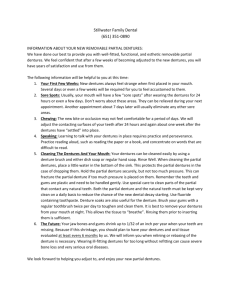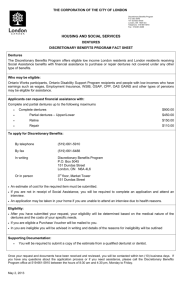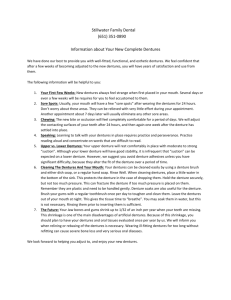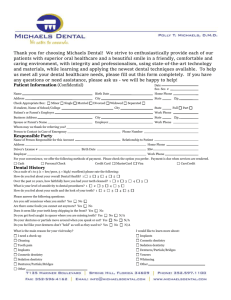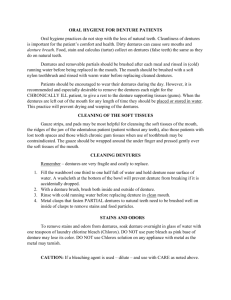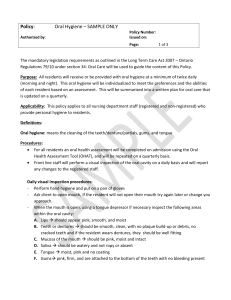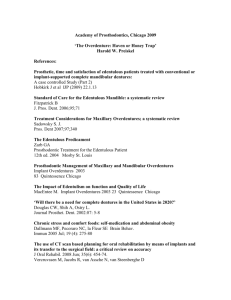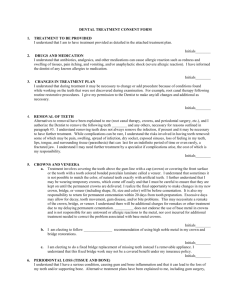Denture Instructions - DeGeorge Dental | Lebanon, NJ 08833
advertisement
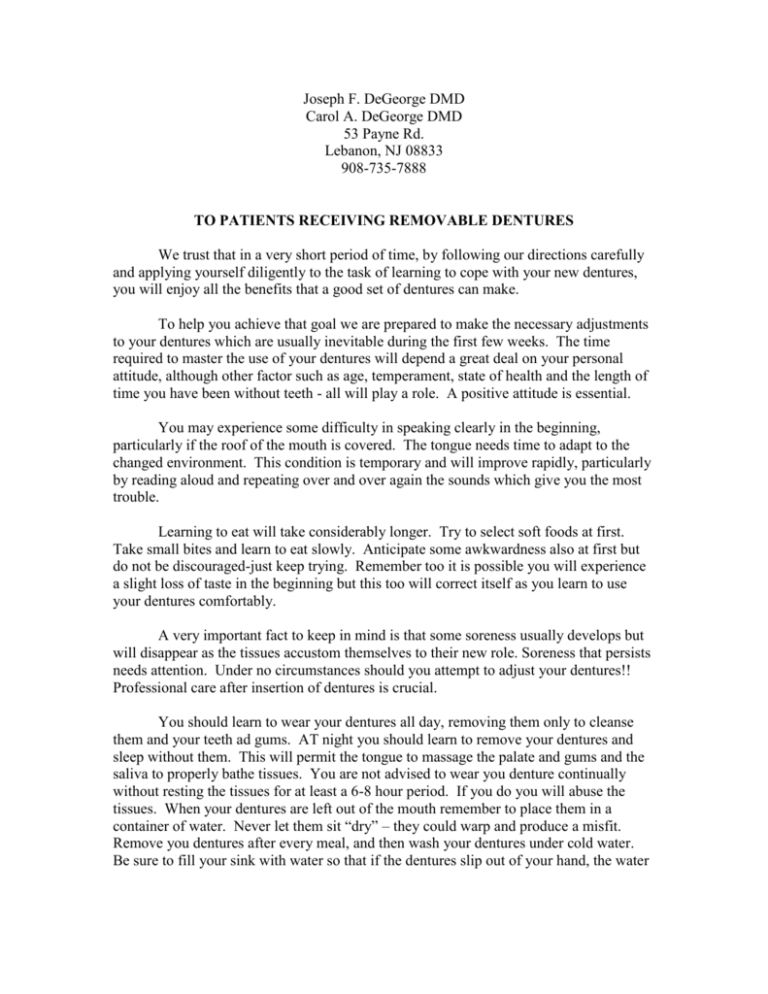
Joseph F. DeGeorge DMD Carol A. DeGeorge DMD 53 Payne Rd. Lebanon, NJ 08833 908-735-7888 TO PATIENTS RECEIVING REMOVABLE DENTURES We trust that in a very short period of time, by following our directions carefully and applying yourself diligently to the task of learning to cope with your new dentures, you will enjoy all the benefits that a good set of dentures can make. To help you achieve that goal we are prepared to make the necessary adjustments to your dentures which are usually inevitable during the first few weeks. The time required to master the use of your dentures will depend a great deal on your personal attitude, although other factor such as age, temperament, state of health and the length of time you have been without teeth - all will play a role. A positive attitude is essential. You may experience some difficulty in speaking clearly in the beginning, particularly if the roof of the mouth is covered. The tongue needs time to adapt to the changed environment. This condition is temporary and will improve rapidly, particularly by reading aloud and repeating over and over again the sounds which give you the most trouble. Learning to eat will take considerably longer. Try to select soft foods at first. Take small bites and learn to eat slowly. Anticipate some awkwardness also at first but do not be discouraged-just keep trying. Remember too it is possible you will experience a slight loss of taste in the beginning but this too will correct itself as you learn to use your dentures comfortably. A very important fact to keep in mind is that some soreness usually develops but will disappear as the tissues accustom themselves to their new role. Soreness that persists needs attention. Under no circumstances should you attempt to adjust your dentures!! Professional care after insertion of dentures is crucial. You should learn to wear your dentures all day, removing them only to cleanse them and your teeth ad gums. AT night you should learn to remove your dentures and sleep without them. This will permit the tongue to massage the palate and gums and the saliva to properly bathe tissues. You are not advised to wear you denture continually without resting the tissues for at least a 6-8 hour period. If you do you will abuse the tissues. When your dentures are left out of the mouth remember to place them in a container of water. Never let them sit “dry” – they could warp and produce a misfit. Remove you dentures after every meal, and then wash your dentures under cold water. Be sure to fill your sink with water so that if the dentures slip out of your hand, the water will break the fall. If you wish, a commercial denture cleaner or a mild soap with a soft brush will do a good cleaning job for you. If you have a partial denture, it becomes doubly important that you maintain your mouth in a state of meticulous cleanliness. The teeth under the clasps are especially susceptible to decay, since they no longer receive the same cleansing action of the cheeks, tongue and saliva. Therefore it is imperative you brush and floss your remaining natural teeth after each meal. Lastly, remember that the belief that a denture, partial or full, is “permanent” is a myth since mouth tissue, like all body tissues, are undergoing constant change. Your dentures require periodic examination to determine whether excessive changes have occurred. Many times patients are not aware that these changes have occurred. They become aware when it’s too late – when the gums have resorbed excessively. Make it a habit to return to the dentists twice a year for inspection of your teeth and tissues. Periodic refitting of you dentures will go a long way toward preserving your remaining teeth and tissues. HOW TO CLEAN YOUR DENTURES You should soak them in a chemical solution for about twenty minutes or according to manufacturer’s directions. After removing from solution, dentures must be brushed and rinsed thoroughly. Types of soaking solutions 1. Commercial denture cleaning solutions may be used for either dentures or partials. 2. Homemade soaking solutions: a. ½ teaspoon baking soda or salt combined with 8 ounces of warm water. b. To remove heavy stain and tartar, you may use: 1 teaspoon white vinegar combined with 8 ounces of warm water. FIVE TIPS TO REMEMBER 1. Take your dentures out a bedtime or for at least 3 to 4 hours daily to let your gums breathe. 2. Place your dentures or partial in water when they are out of your mouth because they will warp, change their shape and not fit properly. 3. Each time the denture or partial is removed, rinse your mouth with warm salt water to remove extra food particles, 4. Gently brush and massage your gums and tongue to stimulate circulation. 5. It is important to have regular dental check-ups to protect you and your dentures.
